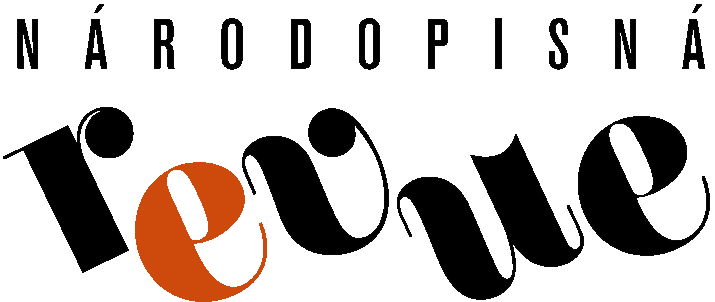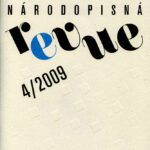Journal of Ethnology 4/2009 is devoted to literary folkloristics, text and transdisciplinarity. In her essay, Marta Šrámková deals with transdisciplinarity as a methodological conception (Transdisciplinarity and Commemorative narration). Petr Janeček pays attention to development of literary folkloristics within the context of other scientific disciplines (The texts and contexts. Some comments on the position of literary folkloristics between European ethnology and cultural anthropology). Slovakian ethnologist Tatiana Bužeková aims her essay at cognitive anthropology applied in study of folklore material, especially at the genre of superstitious narrations (Rarášok and zmok as cultural representations or why do the survivals survive?). Polish folklorist Dorota Simonides searches the parallel between medieval sources and contemporary oral literature (Medieval exemplum and contemporary folklore).
Transferring Tradition column publishes the article by Eva Večerková on contemporary customary traditions (St. Nicholas carolling in the region of Znojmo). Section Interviews is devoted to Slovakian ethnologist Eva Krekovičová (*1949). Social Chronicle remembers the anniversaries of ethnologist Alena Prudká (*1949) and musician Zdeněk Bláha (*1929) and publishes the obituary note of ethnologist Zdeněk Mišurec (1925–2009). Other regular columns include the contributions to discussions, reports from conferences, festivals and professional activities, as well as reviews of new books and reports on the activity of the National Institute of Folk Culture in Strážnice.
Transdisciplinarity and commemorative narration
On an example of a kind of folklore - commemorative narration, the essay is understood as a reflection on the relation of folkloristics to the methodology of multidisciplinarity, interdisciplinarity and especially to the new methodological stream – transdisciplinarity. It substantiates the folklore to reflect the social, cultural, historic, ethnographic and other “non-folklore” phenomena in which it is performed and actualized, meeting its functions. Therefore, the relation of folkloristics to other disciplines is (and has to be) opened and its methodology is (and has to be) interdisciplinary. The main and crucial criteria for folklore analysis and interpretation cannot be substituted, however, by the methods of “non-folklore” disciplines. The methodology of transdisciplinarity supposes such an abstracted folklore phenomenon (factum, sign), becoming a part of the problematics ruling over the interdisciplinary approach and representing its common “keystone”, to be applied across the branches. There are applied both the elements of anthropology, culturology, sociology, elements of communication etc. New professional literature is used and annotated in the analysis. The common observations are demonstrated in different versions of commemorative narration. The traditions and experience of Czech folkloristics are emphasized as well.
The texts and contexts. Some comments on the position of literary folkloristics between European ethnology and cultural anthropology
The study reflects on the actual position of literary folkloristics (not only) within the domestic academic discourse. Although - at the very beginning of ethnologic research – the studies of folklore texts were in the foreground and a more remarkable interest in artefacts of material or folk culture as a whole occurred much more later, at present the study of folklore reaches a certain marginal position, being even part of rhetoric proclaimed by proponents of different schools in cultural and social anthropology. The essay reflects on the causes of the above contemporary phenomenon, considering the inherent characteristics of folkloristics, and – simultaneously – outlining the impulses to the next development thereof. The main sense and importance of literary folkloristics, a discipline being in an apparently “schizophrenic” position on the boundary between humanities and social sciences, is regarded not as taking-over of the period conjunctural themes, theories or methodologies from other branches, but as emphasizing of collection and analysis of the texts widespread by word of mouth, which should especially be in the foreground of folkloristic researches.
Rarášok and zmok as cultural representations or why do the survivals survive?
The paper focuses on the theoretical perspective of cognitive anthropology applied in study of folklore. The author aims to demonstrate that the terms “folk beliefs” and “superstitions” used in folkloristics relate to the definition of folklore as a “survival” peculiar to the earlier anthropological theory of cultural evolution. Cognitive anthropology offers a different approach to study of cultural phenomena. From the cognitive point of view, the so-called superstitions are representations incorporating anti-intuitive concepts. Some of them could have their origin in old pagan beliefs, but this is not the main factor influencing their transmission: the distribution of anti-intuitive concepts is determined by how the human mind works. Narrations containing those concepts are related to a concrete social context and do not necessary refer to the religious feelings or religious faith. On the example of rarášok and zmok – supernatural beings from Slovak folk tales – the author demonstrates that the hypothetical religious origin of folklore images does not explain their present “survival”. Distribution of rarášok and zmok’s representations could be explained in terms of Pascal Boyer’s theory. Rarášok and zmok appear in tales with interpretation of misfortune in terms of supernatural forces. Long-term reproduction of corresponding narrative schemata could be explained by further cognitive theories dealing with certain aspects of human cognition related to concrete social situations.
Medieval exemplum and contemporary folklore
The study deals with both the view of the importance of exempla, and the rarely applied methodological procedure, i.e. the interpretation of contemporary front-page stories telling as a parallel to medieval exempla telling. The incorporation of exempla and folklore tales within the context of culture, level of education and “everyday life”, which features with a rapid rate and new ways in disseminating the information – opposite to the Middle Ages – is of great importance. The co-existences of different social classes, traditions and cultures play an important role. Exempla are understood as a certain type of bridges built between folklore and literature by the activities of medieval preachers. Both the ethic function of exempla and their role in creation of cultural and historical consciousness are pointed-out. Many exempla converted into other folklore kinds during their development. When interpreting the exempla and contemporary front-page stories, the attention is to be turned to the “narrative situation” and the recipient. The variability of a story is caused by the actualization of place, time and circumstances in which the story is set. A folklorist is to observe this procedure.



